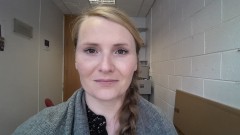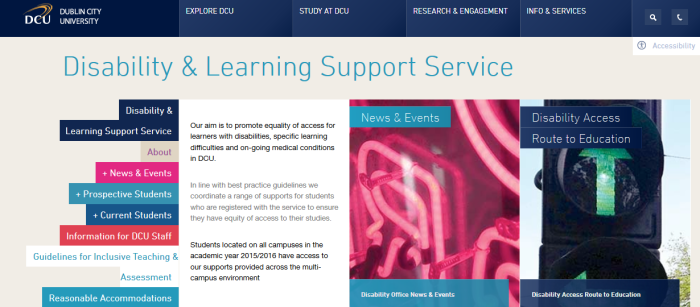
….. Susan Madigan, Occupational Therapist, Disability Service, Dublin City University.
1. What does an Occupational Therapist do?
Occupational Therapists work with people in relation to their daily activities or “occupations”. We work with people who are not currently able to do the things that they want to do, or the things that they need to do. We work with people to build their own skills, but we also look at what can be changed in the physical and social environment, to enable people to be more independent. Occupational Therapists work in a variety of settings for example; with children in schools and clinics, teenagers and adults in mental health settings, and older people in hospitals and in trying to enable them to stay in their own homes.
2. Why did you choose Occupational Therapy?
I was involved with lots of different voluntary work since my teenage years, even using most of my annual leave from my bank job to volunteer with different groups, including Barretstown. All of the volunteer work I did was involved with facilitating or enabling people to do the things they wanted to do. When I was looking for a change of career, there was only one job that appealed to me – variety, fun, working with people, and definitely not a typical desk job!
3. Where did you train and how long did it take?
I completed the four-year undergraduate course in Trinity College, Dublin. There is a mix of academic work, practical projects, and work placement – 1000 hours over the four years. The Occupational Therapy course is tough, but very varied, so there’s always a new module or topic to get stuck into. Though financially it was a struggle, as I had already completed a degree, and so had to pay for my course, it was the best decision I have ever made. I will still be working and enjoying my work for years to come!
4. What qualities and skills does an Occupational Therapist need?
OTs need to be great communicators, love working with people, and have a knack for creative problem solving – a big part of our job. For me, a very important quality is being non-judgemental. We don’t know who our next client will be, and it’s important for us to leave our biases at the door, and work with our clients to reach their goals.
5. Have you always worked with young people?
Yes, I have always enjoyed working with young people since training the 1st year netball girls at school! I love working with young people, it’s so much fun, and really keeps me on my toes. I have been very fortunate to work with young people over the past 20 years as a cinnire at Irish college, an inner city tutor at college, and a Cara at Barretstown. As an Occupational Therapist, I worked for a year in a Child and Adolescent Mental Health Clinic, which was great as I got to work with small children right up to school leavers. As an Occupational Therapist in third level, I have worked in Trinity College, Dublin Institute of Technology, now DCU.
6. What kind of support do you provide to college students?
My main role is to support students to participate in everyday activities that are important to them. We generally support students to make changes in their academic habits, communication, time use and well-being areas. I do this by facilitating students to identify changes they would like to make in their daily life, coach them through reaching their goals, work together to develop their skills, and reflect on the positive outcomes. An important aspect of Occupational Therapy is that we encourage the development of a person’s own strategies and skills, to enable them to manage life’s ups and downs after college. The Occupational Therapy process is very practical and functional, and focused on getting things done now and in the future. It is about doing!
7. What do you like most about your job?
I enjoy the variety of working with a diverse group of clients especially at third level. We have school leavers up to retirees, international students, and work with people managing physical, neurological and mental health conditions. I like meeting with new clients and introducing them to the ideas of Occupational Therapy, and the best thing is seeing students graduate with their well-earned degrees after working together over a number of years.
8. Are you working on any projects at the moment?
We are always working on lots of projects 🙂 One that we are quite excited about is a programme we piloted in the summer, to support people repeating exams. It is an intensive week of interactive workshops and structured study sessions. We are now going to roll it out for the annual Christmas and Summer exams, and is especially useful for students with exam anxiety or those who have difficulty performing well in exams for any reason.
9. What is your top tip for students starting college?
Pick the right course! Get some advice from people you trust, and be happy with your choice. Take some time out before college if you need to, this is an important decision. Once at college ask for help if you need it. There are lots of resources to help people settle in.
10. How can parents help?
Parents can really help by supporting their young person to choose a course that will suit them. Of course you should pick the course you are interested in, but not all courses are created equally. Some courses are extremely academic, with little group work or interaction. Some are highly practical and focus more on building functional skills, rather than academic learning. Arts in NUIG may look very different to Arts in DIT. What will suit you best? Encourage your child to do something they are interested in, remember, they have to study it for 3-4 years (not you) and doing something they dislike because “there’s a job in it” does not make for a successful student.
